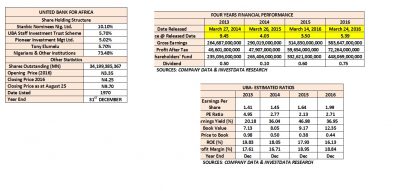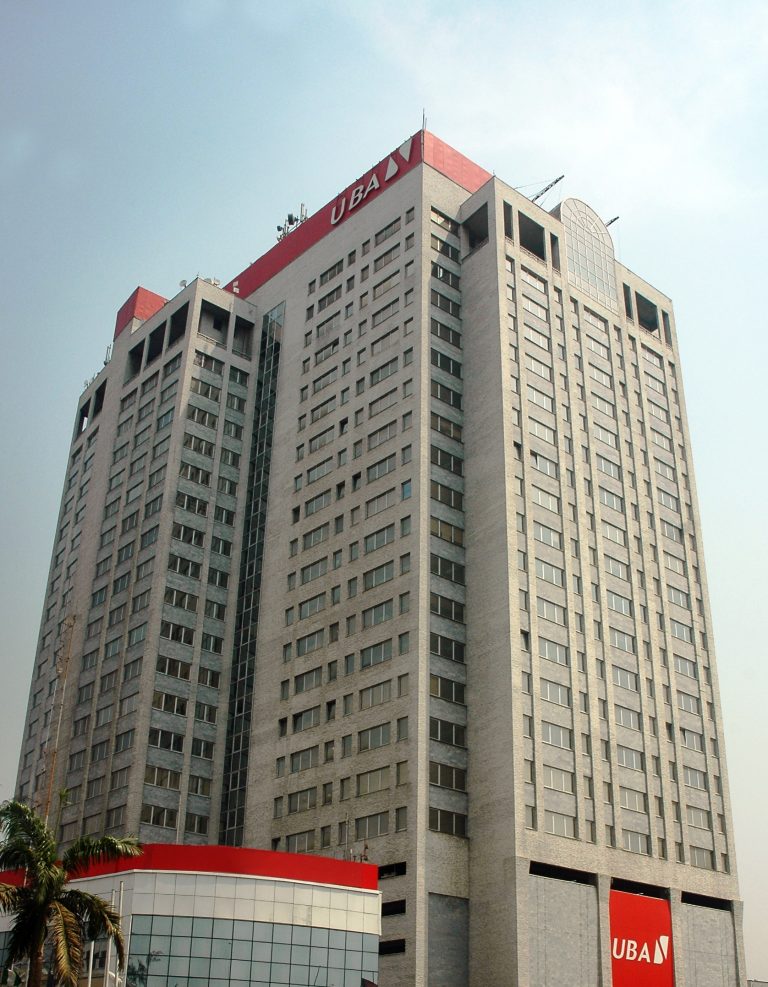The management of United Bank for Africa released it audited 2017 half year earnings report to the market last week In line with its post-listing requirement, earlier than that of 2016, thereby allowing investors forecast and plan their investment. The bank’s reengineering and continued expansion across the continent as Africa’s global bank continues to yield bountiful results as revealed by its diversified revenue base, soaring profitability ratios and growing balance sheet all of which have helped to support UBA’s repositioning into an African financial powerhouse. The commitment of its board and management to creating value for its shareholders and banking public through improved service delivery, new products and services that are people oriented to support strong assets quality. All of these translate to improved top and bottom-line, translating to good dividend payout that reflects on its share price even as it remains toast of Nigeria’s investing community.
UBA Plc’s numbers for the period under review show an impressive performance as its top and bottom lines were northward. Gross earnings rose 34.8% from N165.58bn in 2016 to N222.72bn on the back of a 44% growth in interest income due to improved yields on the loan book and high yields from money market instruments, just as Interest expense growth was slower at 24% due to the higher Interest rate environment. Higher growth in Interest Income relative to expense resulted in a 58% growth in Net Interest Income. Consequently, Net Interest Margins (NIMs) improved to 7.3% better than full year 2016 NIM of 6.7%. But the fees and commission Income remained relatively flat for the period under consideration, while profit before tax rose by 56.2% to N42.34bn from N27.11bn in 2016.
Other Income (Net trading Income and foreign exchange Income) was up 47%, mainly driven by a 238% increase in foreign exchange trading income while Net Fair value gain on derivatives was down significantly. Operating expenses grew significantly, up 27% while total operating income notched 39%. This resulted in an improvement in cost-to-income ratio to 58.6% outside loan loss provision from 62.4% in 2016. Growth in operating expenses as revealed by the numbers were driven partly by higher personnel cost, due to the promotion of 3,000 staff, inflationary pressure and the impact of Naira devaluation. Loan loss expenses increased 38% and Cost of Risk (CoR) increased slightly to 1.2%.
The recent cancelation of UBA’s 2,080,140, 955 shares further boosted Earning Per Share to 124 kobo in Q2 is a replica of the price in 1.94x, which is higher than the 1.54x recorded in 2016. The quarter’s Book Value grew by 25.71% to N14.13 from N11.24. The bank’s Price to Book ratio is 0.68 against 0.41 in the corresponding period 2016.
The decision of UBA’s management to open shop in six more Africa countries is expected to further grow offshore contribution to top and bottom-lines above 40% very soon, while reengineering of its Nigerian operations for improved profitability that would enable it compete strongly with the younger new generation banks and overtake them in no distant time if this tempo is sustained.
Technical View
UBA price action has formed a bullish channel for more than a year and is recently forming a pennant within the channel that supports continuation of trend. The positive sentiments on its strong financials and high buying pressure as the stock is trading above 100 DMA and RSI is reading 72.51 which is at overbought region. Signaling sell for traders as pullback is imminent due to profit taking.

All the momentum indicators indicate sell except for MACD that is saying buy at the current price.
Valuation
The bank’s share price is considered attractive at trailing 1.94x of earnings. Its recent financial results and upgrade to full year 2017 guidance are indicative of strong performance that continues to deliver on expectations, even as the shares trade at Price/Book ratio of 0.68x and Profit Margin of 19.01%. Meanwhile, the Book Value reveals an underpriced situation, trading below its Book Value of N14.13 per share, following which each unit of UBA is fairly priced at N18.00.
Analysts Opinion/Recommendations
Since the Kennedy Uzoka-led management came on board its impressive performance and stronger numbers had supported the rally so far in the year, especially since early-March 2017 when it broke out the trend line. With the numbers reported in this Q2 result, the bank full year EPS is projected to be in the region of 252 kobo. As summarised in the table above, the bank’s investment ratios are strong and attractive for discerning investors to look its way. We have placed a POSITIVE rating on the stock of UBA, BUY.
Management to drive positive scorecard
The bank’s management has so far demonstrated commitment to repositioning it for enhanced profitability, following which the board has for the third consecutive year offered a 20 kobo interim dividend.
Moreso, UBA was very proactive with its balance sheet deployment in the review period. The bank’s defensive strategy has remained very effective, ensuring that the backlash of some regulatory policy changes is mitigated. The Naira, Nigeria’s pressured local currency is a major disincentive for UBA to sustain this venture, but its offshore earnings through its operating network has also supported bottom-line.
Four-Year Performance (2013-2016)
The bank’s numbers in the period under consideration has remained resilient, despite the tight economic conditions especially since the crash in oil prices and the resultant pressure on disposable income of many households, which may have been the major restraining factor for creation of risk assets.
Gross earnings for the period grew by 45% to N383.65bn from N264.69bn in 2013, even as profit for the period was stable despite the over regulation in the industry with banks having to make different set of provisions in line with Prudential Guidelines. Bottom line for same period was up by 55% to N72.26bn from N46.6bn in 2013.
Return on Capital Employed and Assets for the four-year period were 19.8%, 1.8%, 18.1%, 1.7%, 17.9%, 2.2%, 16.13% and 2.06% in the four years respectively from 2013 2014 2015 2016. Return on Equity was 16.13% in FY-2016, down from 18.84% in FY-2015 while Return on Assets experienced a marginal decline for the same period to 2.06% from 2.17% year on year. It also grew Net Assets for the period by 90.64% from N235.04bn in 2013 to N448.09bn.

Ratio Analysis
The bank has sustained upward earnings trend that supported price performance as the EPS moved from N1.41 in 2013 to N1.99 in 2016, just as Price to Earnings Ratio remained unstable due to the up and down movement in equity prices.
In arriving at our fair value price for the stock, we focused on its historical financial performance and our expectations for full year 2017, which was calculated using the Price to Book Value method of valuation as well as the Dividend Discount Model comprising our expected dividend estimate for the bank and to adjust for the risk of investing in the Nigerian Financial Services sector. We have placed a POSITIVE rating on the stock of UBA.








